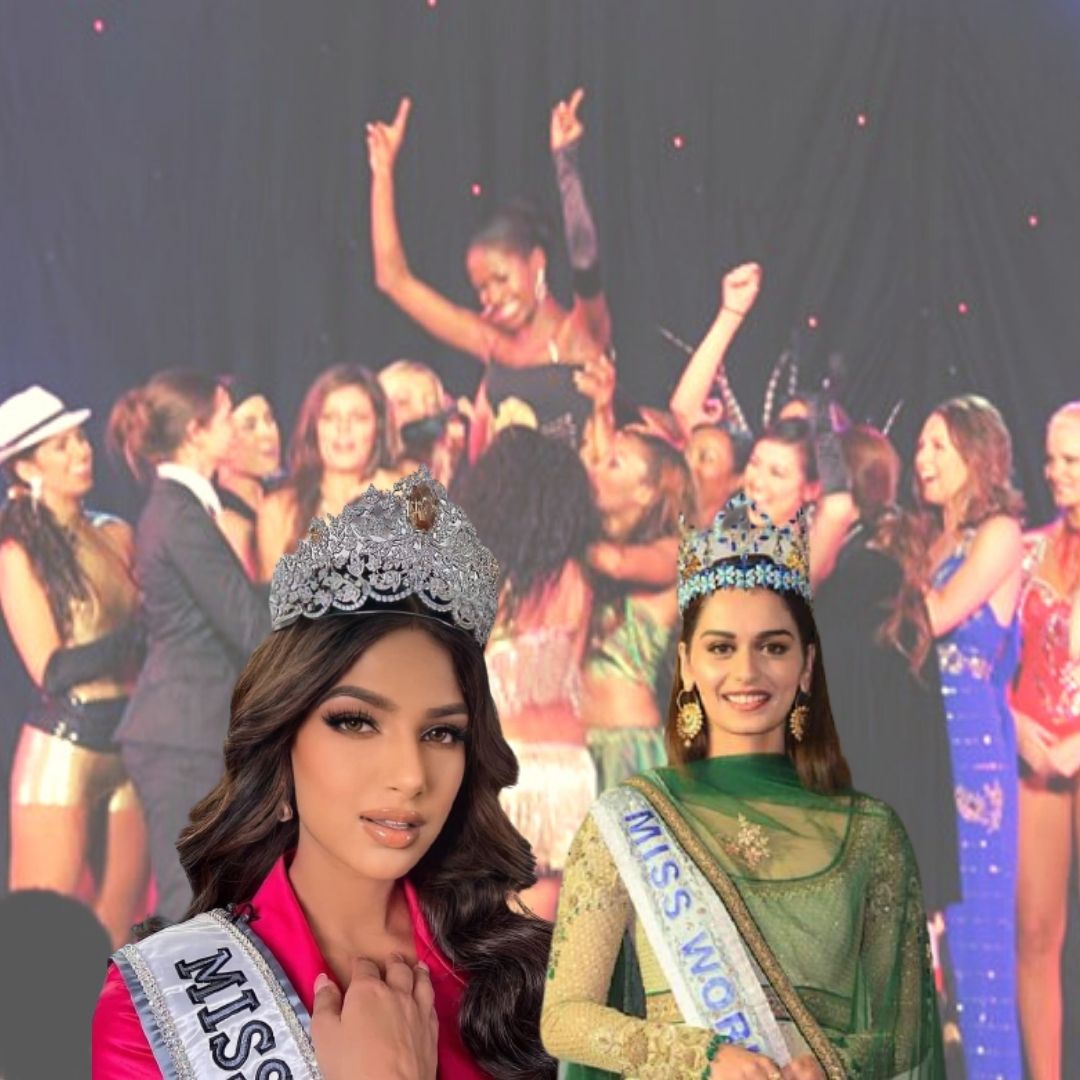
Image Credits: Wikimedia, Twitter/Harnaaz Sandhu, Twitter/Vinayakam Jain
Empowerment Or Objectification? Beauty Pageants' Debate Presents Both Sides Of The Coin
Writer: Akanksha Saxena
I am a budding journalist who loves to write stories that have the ability to connect with people.
India, 28 Jan 2022 8:33 AM GMT
Editor : Ankita Singh |
A literature lover who likes delving deeper into a wide range of societal issues and expresses her opinions about the same. Keeps looking for best-read recommendations while enjoying her coffee and tea.
Creatives : Akanksha Saxena
I am a budding journalist who loves to write stories that have the ability to connect with people.
Competitions like Miss World, Miss Universe, etc, have gained popularity over the years for providing lucrative opportunities to women from different walks of life. However, beauty pageants have their downsides as well.
For time immemorial, beauty pageants have been extremely popular. Over the years, participation in such contests has increased with women coming from different walks of life. Competitions like Miss World, Miss Universe and others provide numerous opportunities. From economically developed countries to smaller nations, women participate in pageants, giving them a platform to achieve their dreams. As decades went by, beauty pageants evolved. Not just superficial aspects, it encourages the contestants to represent their countries and showcase their identity, standing out from the rest.
However, beauty pageants have been subjected to fierce debate. While the contests give a direct ticket for success, fame and recognition, they are seen as a tool of patriarchy and objectification, reinforcing stereotypical standards of beauty. Therefore, the arguments surrounding beauty pageants represent both sides of the same coin, resulting in a myriad of opinions being thrown in from all around.
An Empowering Platform
When it comes to beauty pageants, India has performed exceedingly well. Till now, the country has won six Miss World titles and three Miss Universe crowns. It all started in 1966 with Reita Faria bringing the nation's first Miss World crown. Almost 30 years later, 1994 was a successful year with Aishwarya Rai Bachchan and Sushmita Sen winning Miss World and Miss Universe titles respectively. After Rai, Diana Hayden won in 1997 and Yukta Mookhey two years later, followed by Priyanka Chopra Jonas in 2000. The same year, Lara Dutta became the second Indian after Sen to win the Miss Universe. Now, Manushi Chillar and Harnaaz Sandhu are a part of the elite list when they won Miss World 2017 and Miss Universe 2020 respectively.
For young Indian girls, the beauty queens have proved to be a source of inspiration. Many of them have come from a middle-class background who went on to win the coveted title. The pageants put all the participants on an equal footing, irrespective of the circumstances they have faced in their lives. The contestants who take part are not just restricted to the beauty industry. They belong to different professions, from medicine to law and many others.
Therefore, several people believe that beauty pageants promote empowerment and lucrative opportunities. "These opportunities not only knock on doors of empowerment but also boost up their confidence of other beauticians and designers who always wanted to build a career in this field. So banning them is not an option," a user says on Instagram. Another user lauds the sheer hard work contestants put towards representing the country on a global platform. "If a woman chooses to work on herself, groom herself and wear a bikini or a hijab- it's her choice! The 'objectification' isn't done by the pageants. It is done by the viewers," another user gives her two cents, further criticising their stereotypical representations in popular culture.
Epitome Of Objectification
Positive opportunities aside, there is another side of the story. In every country, beauty pageant winners hold a special place in everybody's hearts. However, such contests are known for promoting eurocentric standards of beauty. While they aim to boost self-confidence, not many can find the standards approachable or relatable as they normalise idealistic and stereotypical features that the world finds acceptable. Recent years has seen a rise in social media. A person's presence on the platforms plays an important role in peer popularity.
As a result of this, countries scramble to choose the right representative on such platforms. The ideal yet toxic standards of beauty pit women against each other who are scrutinised under the patriarchal lens. Further, the discriminative criteria are restrictive in nature. With beauty being the prime judgment criterion, which only diminishes a young girl's confidence in who wishes to represent her country on this level. Beauty pageants are popular for visual consumption. The 'swimsuit' round is avidly watched by millions of viewers, where the contestants could be objectified for their appearance. The 'male gaze', unfortunately, plays a pivotal role in the participant's popularity.
Another scathing critique against beauty pageants is the lack of inclusivity. The participation framework gives weightage to women in a certain age group. Not only that, prospective candidates should be single in order to participate. The mainstream beauty pageants have no place for members of the LGBTQIA+ community, making such contests all the more discriminative in nature.
Many readers feel that beauty pageants are, indeed, sources of objectification. "What sort of empowering comes from women literally being told they can't participate if they don't fit into the physical criteria, of which they have no control. I mean, can a person who is below 5'4" and has not so flattened tummy, not help people around the world. If this doesn't say 'objectification' then I don't know what will," a user said. A majority of users felt that it promotes the interest of women who have fair skin and a thin body figure. "It is most certainly a very regressive thing. Judging on basis of desirable physical attributes and politically correct answers to win is followed by the pursuit of typically narcissistic and obsessed behavioural practices. These beauty pageants are demeaning to the whole concept of 'Feminism', another user reacts.
One user pointed out the negative implications on the youngster's mental health, "I know, from experience, of teenagers who look up to the models. The inability to reach the same standards that send them into a series of mental/physical pressure situations." Further, she elaborates on the fact that it has given rise to eating disorders and face adjustment issues.
Empowerment Or Objectification?
The age-old concept of beauty pageants gained popularity over the years. As times go by, the format has gone through a massive transformation, with the focus slowly shifting to a contestant's multiple abilities, not just their appearance. Nonetheless, the pageants are two sides of the same coin. While it is a lucrative platform for many women around the world who dream to reach there, women are harshly criticised for not looking a certain way.
From boosting self-confidence to pitting women against each other, such contests will be discussed for time immemorial about what they actually represent in the world. It is for you to decide if they are empowering in nature or the epitome of objectification.
 All section
All section














